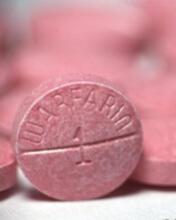New research suggests warfarin may produce worse renal outcomes than non-vitamin K antagonist oral anticoagulants (NOACs) in patients with atrial fibrillation.
In a study of close to 10,000 patients, dabigatran and rivaroxaban were associated with lower risks of adverse renal outcomes than warfarin.
However, risks with warfarin and apixaban were not significantly different.
This research was published in the Journal of the American College of Cardiology.*
“Kidney function decline in patients taking oral anticoagulant drugs is an important topic that has been overlooked in previous clinical trials,” said study author Xiaoxi Yao, PhD, of Mayo Clinic in Rochester, Minnesota.
“Even our past work at Mayo Clinic has been primarily focused on risks for stroke or bleeding.”
For the current study, Dr Yao and her colleagues examined the de-identified records of 9769 patients from the OptumLabs Data Warehouse.
The patients had atrial fibrillation and started taking oral anticoagulants—apixaban, dabigatran, rivaroxaban, or warfarin—between Oct. 1, 2010, and April 30, 2016.
The researchers looked at 4 indicators of kidney function in these patients:
- A 30% or greater decline in estimated glomerular filtration rate (eGFR)
- Doubled serum creatinine level
- Acute kidney injury (AKI)
- Kidney failure.
For the entire study population, the cumulative risk of each event occurring within 2 years of beginning anticoagulation was as follows:
- 24.4% for ≥30% eGFR
- 4.0% for doubled creatinine level
- 14.8% for AKI
- 1.7% for kidney failure.
“Our study demonstrated that renal function decline is very common among atrial fibrillation patients on blood thinners,” Dr Yao said. “About 1 in 4 patients had significantly reduced kidney function within 2 years of being on any of these medications, and 1 in 7 patients had acute kidney injury.”
“In general, patients with atrial fibrillation taking blood-thinning medications tend to have declining kidney function over time,” added study author Peter Noseworthy, MD, of Mayo Clinic in Rochester, Minnesota.
“However, our findings indicate that the non-vitamin K antagonist oral anticoagulants, as a group, are associated with less injury to kidneys than warfarin.”
When the researchers compared all 3 NOACs to warfarin, they found NOAC use was associated with a reduced risk of:
- ≥30% decline in eGFR—hazard ratio (HR)=0.77 (P<0.001)
- Doubling of creatinine—HR=0.62 (P=0.03)
- AKI—HR=0.68 (P<0.001).
However, results differed in one-to-one comparisons.
There was no significant difference between warfarin and apixaban for any of the renal endpoints measured. The HRs (for apixaban vs warfarin) were:
- 0.88 for ≥30% decline in eGFR (P=0.25)
- 0.80 for doubling of creatinine (P=0.51)
- 0.84 for AKI (P=0.16)
- 1.02 for kidney failure (P=0.95).
Dabigatran, on the other hand, was associated with lower risks of ≥30% decline in eGFR and AKI than warfarin. The HRs were as follows:
- 0.72 for ≥30% decline in eGFR (P=0.01)
- 0.64 for doubling of creatinine (P=0.24)
- 0.55 for AKI (P<0.001)
- 0.45 for kidney failure (P=0.21).
Rivaroxaban was associated with lower risks of ≥30% decline in eGFR, doubling of creatinine, and AKI. The HRs were as follows:
- 0.73 for ≥30% decline in eGFR (P<0.001)
- 0.46 for doubling of creatinine (P<0.01)
- 0.69 for AKI (P<0.001)
- 0.63 for kidney failure (P=0.13).
“Patients with atrial fibrillation already face a high risk of kidney disease, perhaps because many such patients have risk factors, such as advanced age, diabetes, and hypertension,” Dr Yao said. “Many drugs these patients are taking rely on kidney function for drug elimination. Therefore, it is particularly important for these patients to choose a drug that minimizes the impact on kidneys.”
“Since non-vitamin K antagonist oral anticoagulants have a different drug mechanism than warfarin, researchers have hypothesized that non-vitamin K antagonist oral anticoagulants may be related to better renal outcomes. Our study is among the first few studies confirming this hypothesis.”
*This study was funded by the Mayo Clinic Robert D. and Patricia E. Kern Center for the Science of Health Care Delivery, which receives no industry funding. However, study authors did declare industry relationships.


